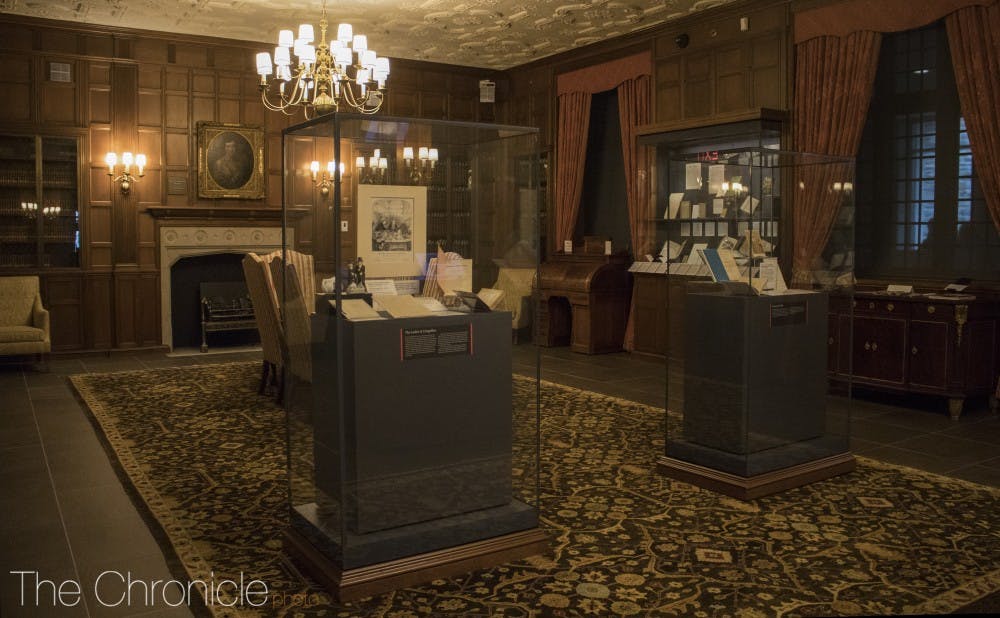To the right of the entrance to the Mary Duke Biddle room in the Rubenstein Library, there is a case of old print advertisements.
One reads “Elizabeth Hare, musical instrument maker;” another, “Nurse Almgill, certified midwife.” At the top of the display is a card painted with a floral design that advertises the services of “Mrs. Baston, Layer out of the Dead.”
The variety of these advertisements hints at the eccentric contents of “Five Hundred Years of Women’s Work,” the exhibition housed within the room and the adjacent Josiah Charles Trent History of Medicine Room and Stone Family Gallery. The exhibition displays works from the Lisa Unger Baskin Collection, a set of thousands of manuscripts and artifacts related to the history of working women.
“[The collection] really shows, through both individual items as well as at large, that women work, women have always worked and their work is documented,” Liz Adams, a rare materials cataloger for the library who gives tours of the exhibit, said.
This fact is on display from the moment one enters the room. In a case to the left is the oldest item in the collection: a grant of land from a man named Marcus to the archbishop of Pisa. Marcus’s wife Ugolinella served as one of the executors of the bequest.
The items on display span the years from the 1200s until the present. The Michael and Karen Stone Family Gallery contains materials from the suffrage movements of the twentieth century, including a reproduction of a large banner that declares “ILFORD W.S.P.U — JUSTICE.”
Other notable items include a letter from Charlotte Brontë to Ellen Nussey, a display of books bound or illustrated by women and the memoir of the Chevalière d’Eon, an eighteenth-century French noble who was born a man but lived as a woman for over thirty years.
The room itself, with wood-paneled walls and low-hanging chandeliers, imparts a sense of gravity to the aged documents. However, the collection’s journey to this setting was far from simple. Fittingly, it is a story of the hard work of dedicated women.
The collection is named after the woman who put it together, Lisa Unger Baskin. Baskin assembled it over a period of forty-five years and kept it at her home in Massachusetts until the Rubenstein Library acquired it in 2015, according to the Duke Libraries website.
“I was very interested in going and meeting [Baskin] and seeing the collection at her home,” said Naomi Nelson, director of the David M. Rubenstein Rare Book and Manuscript Library. “When I saw it, I got very excited… we’re always on the lookout for women’s history, and this is one of the best collections we’ve seen.”
According to Nelson, it was at the time one of the largest privately-held collections of women’s history.
After the collection was purchased by the library, it needed to be moved to Duke from Baskin’s house in western Massachusetts—all 13,000 items. Nelson recalled that the items were loaded into about 600 boxes and shipped to Durham in two trucks.

The library is still in the process of unpacking and cataloguing the collection, according to Nelson. This helps explain why the exhibition only opened this February, four years after the collection came to Duke.
Nelson said that three curators decided which items would be included in the exhibition: herself, Baskin and Lauren Reno, section head of rare materials cataloging at Rubenstein Library.
“We started with the things that were our favorites or that we thought were the most important to show,” Nelson said.
Among her personal favorites is a set of letters written by the Ladies of Llangollen, an aristocrat and an orphan who fell in love and ran away to Wales. Their home became a salon visited by figures such as William Wordsworth, Lord Byron and Queen Charlotte, according to the display’s informational placard.

Baskin hopes that the collection will help students conducting research in women’s history, according to a video on the library website.
Nelson agrees, and she added that the exhibition will allow the general public to discover the same stories that Baskin did.
Get The Chronicle straight to your inbox
Sign up for our weekly newsletter. Cancel at any time.
“Lisa has argued that this history has really remained hidden, and this is the moment where it’s now coming out and is publicly accessible and findable,” Nelson said.
The exhibition is open to the public and Duke students and will remain at Duke until June 15; in December, it will be on display at the Grolier Club in New York City. Guided tours are given on Fridays at 2:00 and 3:00pm, and there are online versions of the exhibition and the entire collection.
Correction: A previous version of this article incorrectly stated that the collection of advertisements is to the left of the entrance, and it has been updated to state it is on the right. The Chronicle regrets the error.
Matthew Griffin was editor-in-chief of The Chronicle's 116th volume.

